There are a million ways to use AI for marketing. You can research topics, write outlines, craft social posts, edit drafts, create images and so on…
There are a million ways to do content marketing. Longform text, shortform videos, gated guides, interview podcasts, live webinars and so on…
So how are content marketers using AI? Today we share a sneak peek at new data from our annual survey. As we wrap up the data collection phase, here is an early look at the data from the AI-related questions.
- How fast are marketers adopting AI? (trends)
- How are content marketers using AI? (methods)
- How is AI impacting the time needed to produce content? (efficiency)
- How is AI impacting marketing outcomes? (performance)
This will be a short post with plenty of charts based on the first 586 responses to the survey. In a few weeks we’ll publish the full report with much deeper analysis, expert input and lots more data.
How fast are content marketers adopting AI?
AI resistance is futile.
Over the past two years, AI adoption among content marketers grew from 65% to 95%. Almost all marketers are using AI in some capacity. Today, only one in 20 are still holding out.
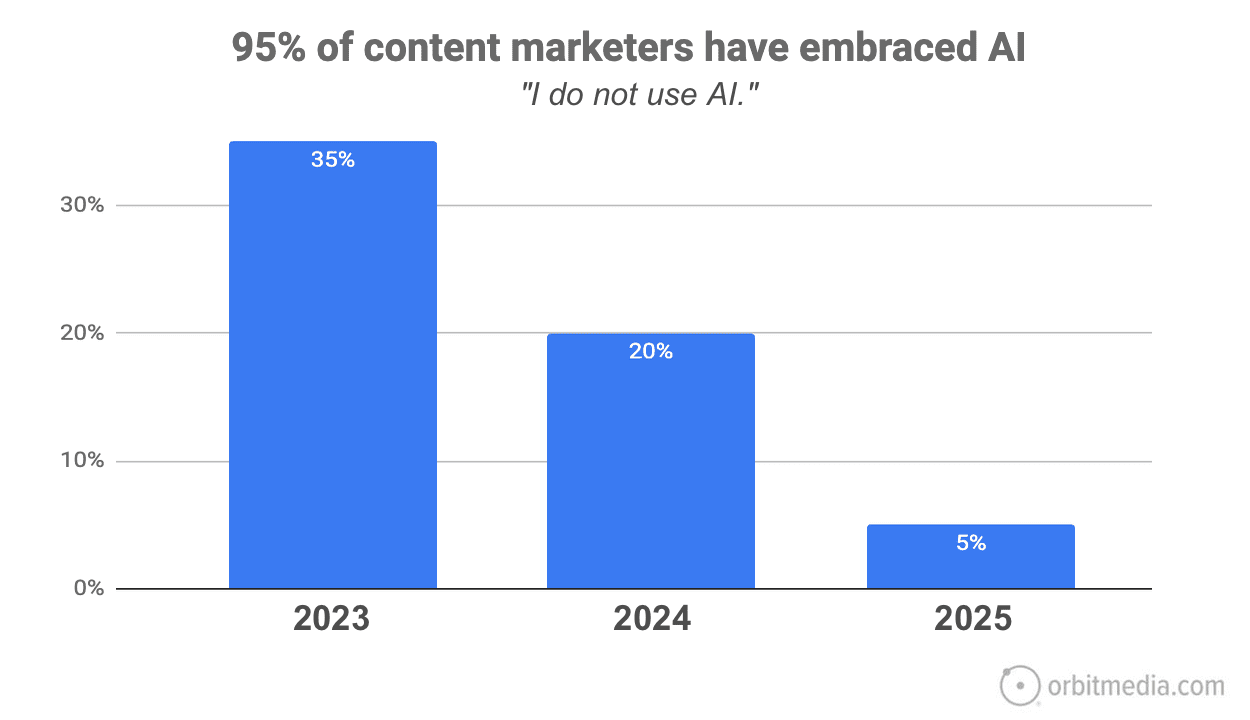
Times change fast in marketing. If you’ve been around for a while, you’ve seen some quick adoption rates. It took only seven years for smartphones to become ubiquitous. It took around nine years for social media to become ubiquitous. These changed marketing fast and forever. But the AI adoption rate among marketers wins the gold medal.
Of course, the ways in which we all use AI varies widely. Let’s look at that data next.
How do content marketers use AI?
Some use it a little; others a lot. And we use AI in all kinds of ways.
To discover how we are all using it in content marketer, in 2023 we added this AI question to the survey. We gave respondents nine options, all related to the content production and promotion process.
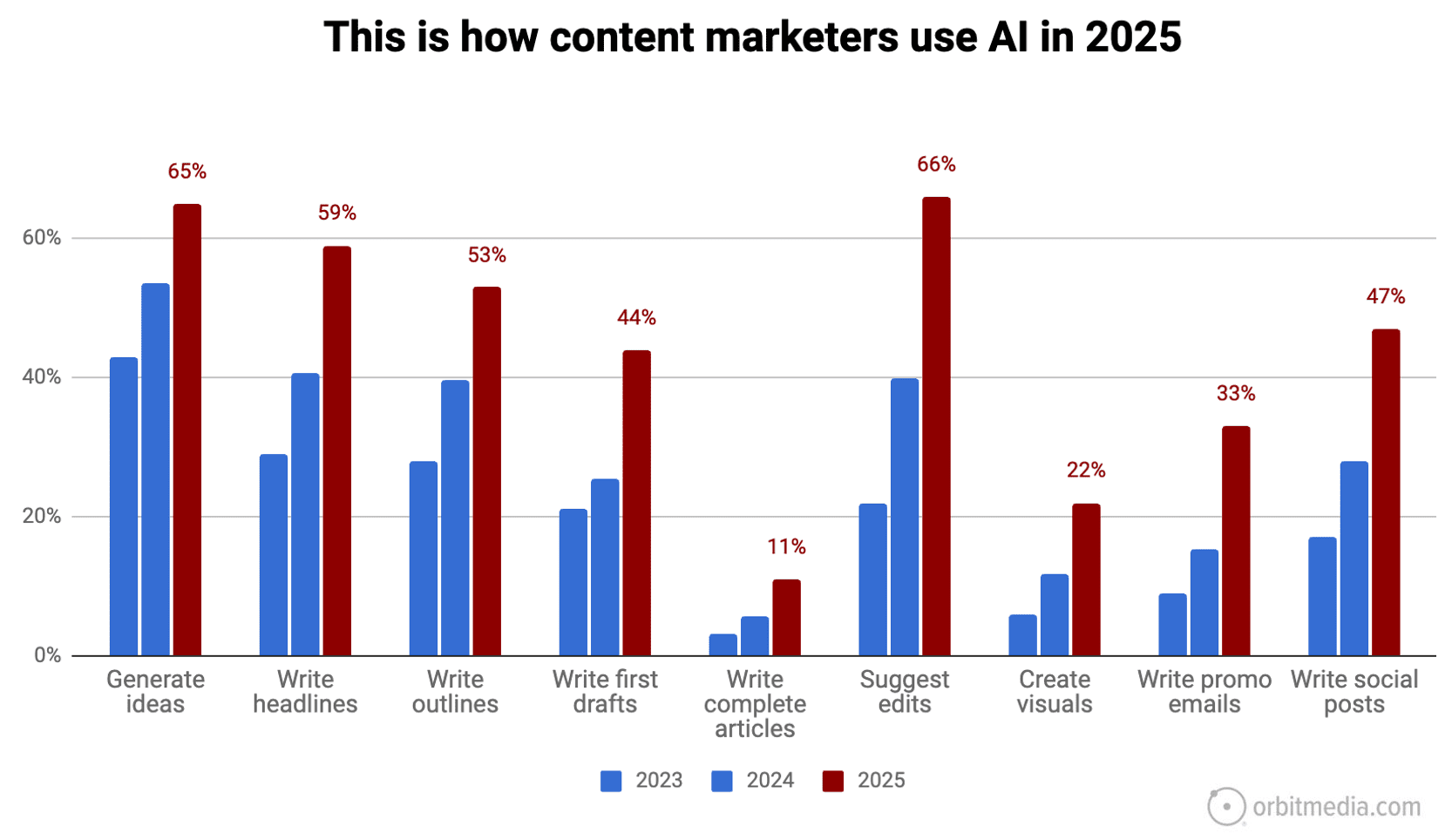
AI, the Editor
For two years “generate ideas” was the most popular use case. Bloggers use AI for research. But this year we see AI used even more later in the workflow. “Suggest edits” is the number one AI use case among content marketers. It’s become our editor.
This could be the use of AI editing tools (Grammarly, Hemingway) or giving drafts and clever prompts to ChatGPT and asking for input. Either way, for two thirds of marketers, it’s in the writing process now and will remain there forever.
AI, the Writer
Writing complete articles still isn’t a common way to use AI. Just one in ten bloggers does it. But more and more marketers are giving it a try. The percentage of marketers who use AI to write complete articles doubles every year.
But in this dataset, this is the least common use for AI. And as you’ll see below, it also may be the least effective. Personally, I don’t use AI to write anything except YouTube descriptions (most people don’t read them). Every word in every article in this newsletter was lovingly written by hand, by me,
Why isn’t writing complete articles a more common use of AI? It may be for reasons many marketers discovered long ago. The best content is filled with visuals, contributor quotes, personal points of view and relevant internal links.
Each of these goes beyond “writing” and none of these are things that AI can do well. AI can’t really help you collaborate with friends or take a stand on a topic. It can definitely write a lot of text, but writing is just one part of content development. Think of the words of Eugene Schwartz, “Copy is not written. It is assembled.”
AI, the Assistant
Our survey lists nine use cases, but of course, there are others. We let respondents type in their own favorite uses of AI and 100+ respondents told us other ways they use AI. Here are some of the most common themes that go beyond those listed above.
- SEO tasks such as keyword research and meta description writing
- Fact-checking (I’m a bit surprised by this one)
- Translation and simplification of complex language
- Summarizing or repurposing content for other formats
- All-purpose writing assistant: getting started, getting unstuck, etc.
It’s helpful in little ways in many places. That bullet list above is an example. Rather than read and try to summarize all of the response data, I gave it to AI and asked it to find the themes. Then I reorganized, rewrote and added my point of view. I saved 10 minutes and now I’m moving on.
Why don’t marketers use AI for more tasks?
We all have concerns. Or rather, 95% of us do, according to the survey responses. Our concerns cover a wide range, from accuracy to quality to ethics.
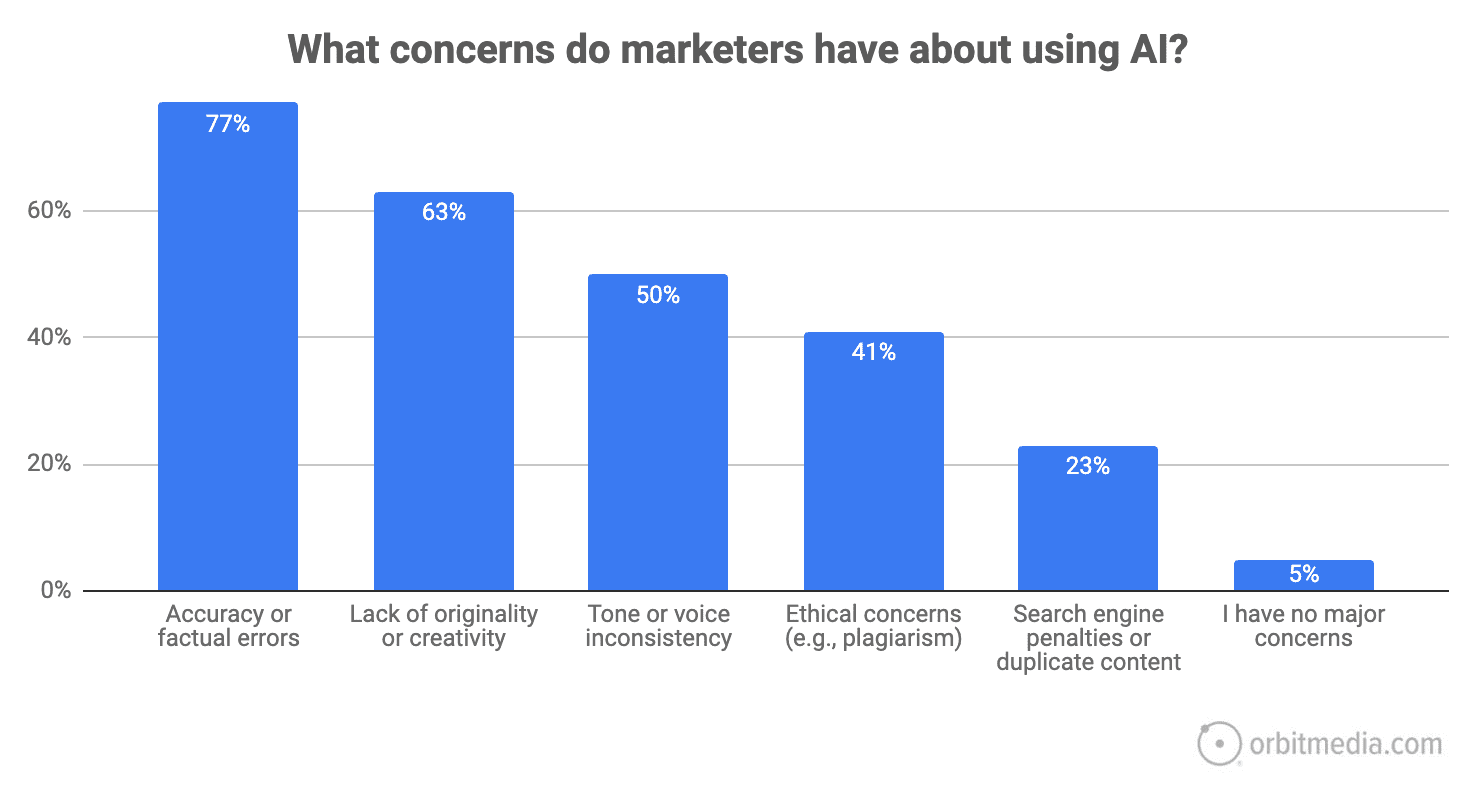
The biggest concern is accuracy, which is understandable if you use it for research and writing. But marketers who use AI to simply audit their content and suggest improvements can sidestep all accuracy issues. With those methods, you’re simply asking AI to give you a point of view.
Next comes lack of originality. This basic limitation of AI because it was trained on the internet, on content that already exists. But there are excellent ways to use AI to find topics that haven’t been covered. The marketer still needs to find their own angle, but highly-original “blue ocean” topics can be discovered fast.
Third is tone of voice and inconsistency, which is also a big potential problem. AI can’t write in a specific brand voice unless it’s carefully and diligently trained. I had to give AI 50+ articles in a customGPT before my experiments in on-brand copywriting showed any results. It may need much more training data than you expect.
Some marketers are also worried about the ethical considerations of AI, which go beyond marketing and beyond the scope of our content strategy.
Finally, search engine penalties are a concern for about one in four marketers. I don’t share this concern for two reasons: first, there is no such thing as a penalty for AI-generated content or duplicate content in search engines. The results might be zero (no rankings or traffic) but nothing else bad will happen. There is no penalty.
Second, if we’re doing the job right, we are making every effort to produce the best possible content for your topic. So we’re not just copy and pasting AI responses anyway. The SEOs who worry about Google penalties should worry first about their visitor. They should worry that their content isn’t truly original, compelling, share-worthy and memorable.
Does AI make content marketers faster?
In little ways and big ways, it’s speeding up marketing tasks. Do we see the evidence of efficiency in the data? Yes, it jumps out in the very first question: How long does it take to write a typical article?.
Each year we calculate the average time it takes to produce an article. After rising for almost ten years, suddenly, marketers are spending less time on each piece on average.
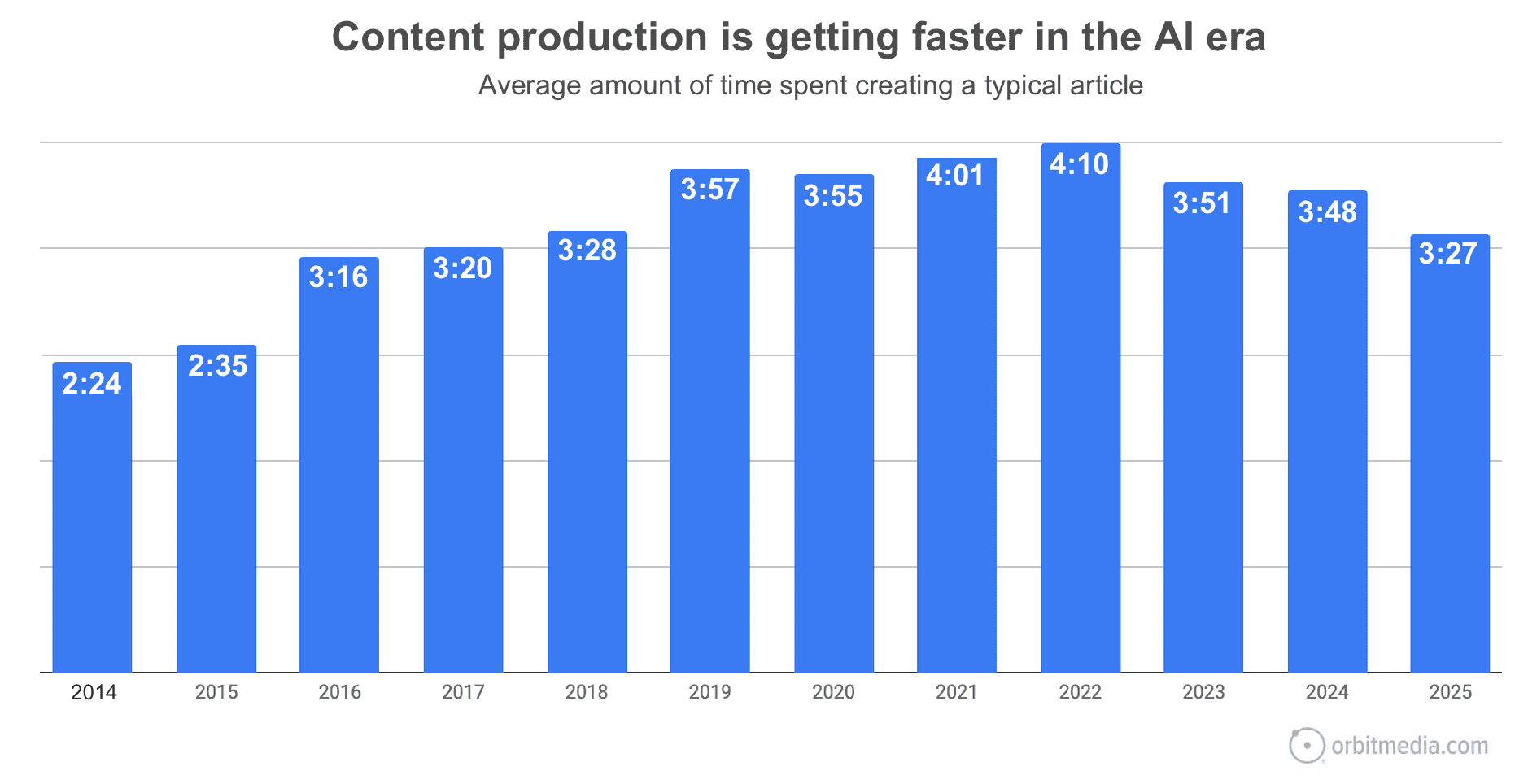
When we separate the respondents who use and don’t use AI, the impact is even more visible. For content production, the data shows that AI tools are creating a roughly 10% efficiency gain. Keep in mind, this isn’t a big dataset. We’ll share our methodology in the full report.
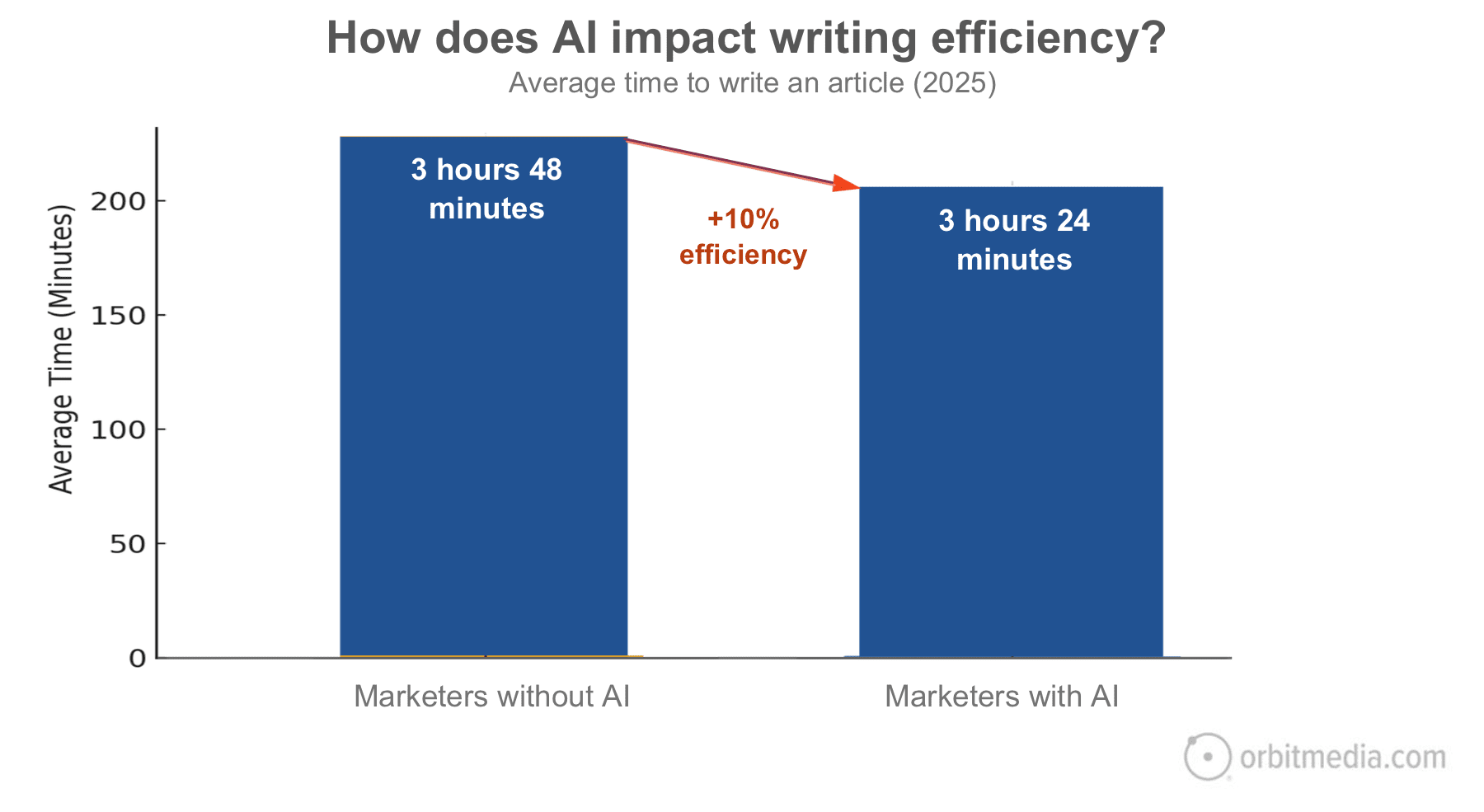
AI can drive performance …when used for some things.
The speed and efficiency data are interesting. But the goal of marketing isn’t to make a lot of stuff fast. It’s to make an impact on business outcomes. If you’re 10% faster at non-performant content, efficiency isn’t your problem.
One of the survey questions is about marketing results. Respondents can answer in four ways. Their content delivers “strong results,” “some results,” “disappointing results,” or “I don’t know.” Of course, the definition of results may vary widely across content creators. We will address this with data in the final report.
20% of respondents report “strong results.” That is our benchmark. When we check the correlations between that benchmark and the various uses of AI, we discover which approaches correlate with marketing performance.
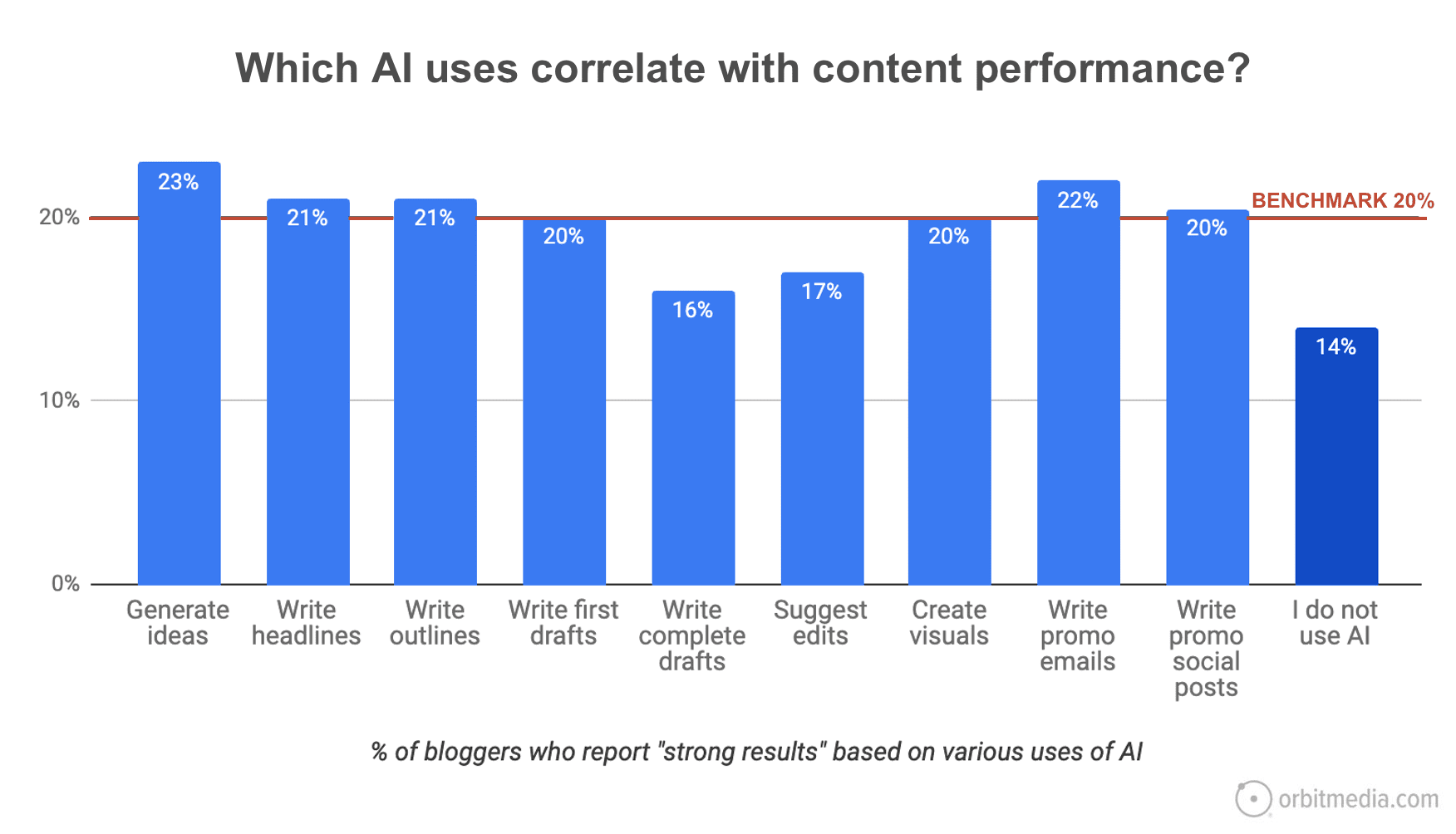
Three approaches to AI fall below the benchmark. The first and most obvious is that marketers who don’t use AI are the least likely to report strong results. They might reconsider.
The second is the use of AI to write complete drafts. Marketers who use AI to write everything are less likely to report “strong results” than the typical marketing. Apparently, content at scale isn’t what drives the best results. Marketers who prioritize speed are getting efficiency at the cost of performance.
We’ll close with an unforgettable quote from Sonia Simone, “Don’t take short cuts. They take too long.”
Keep an eye out for the final report. In the meantime, if you haven’t yet, please take two minutes to complete the survey. We’ll update all the data after the data collection is complete.

